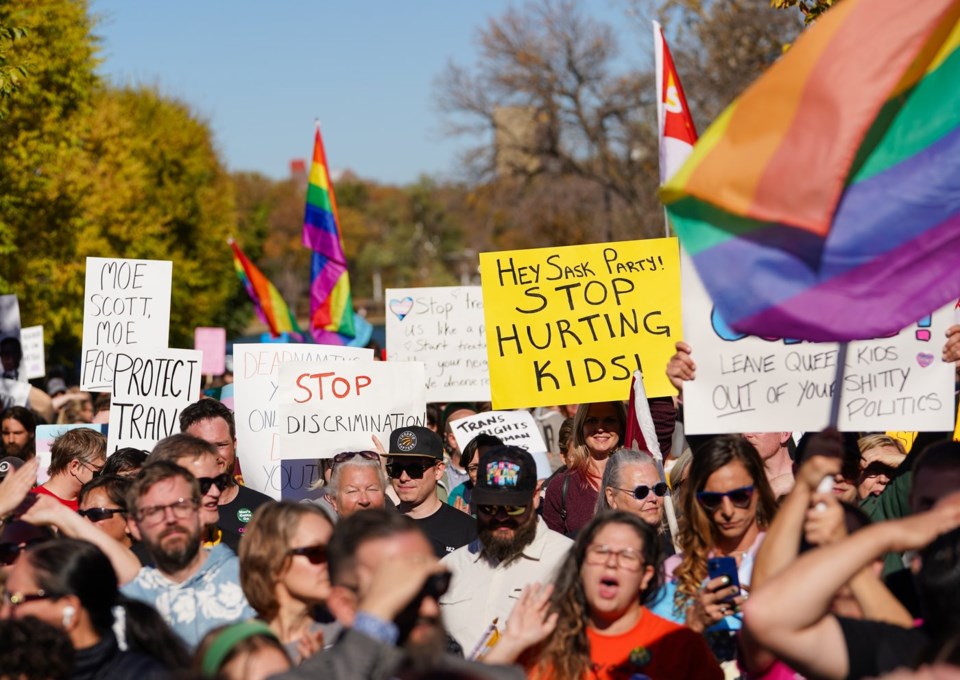REGINA — The Saskatchewan Court of Appeal has ruled a challenge of the province's school pronoun law can continue.
In the decision released Monday, the court granted, in part, the government's appeal of a decision that allowed the challenge.
But the court says a judge has jurisdiction to determine whether the law limits Charter rights.
"(LGBTQ+ group) UR Pride’s litigation may continue in the Court of King’s Bench," the ruling says.
The law, which came into force in 2023, requires parental consent for children under 16 who want to change their name or pronouns at school.
Lawyers for UR Pride brought forward the challenge, arguing the law causes irreparable harm to gender diverse youth and its case should move ahead.
The government argued its use of the notwithstanding clause should end the challenge. The clause overrides certain Charter rights for five years.
Bennett Jensen, legal director at Egale Canada and co-counsel for UR Pride, said they plan to charge ahead with the case.
"We won't stop the litigation," he said in an interview Monday.
"I'm just so aware of the fact that for two years, students in the province have been living under the reality of this law. I'm anxious to bring all our arguments forward as to why their Charter rights have been violated this whole time."
The provincial government, in a statement Monday afternoon, said it's reviewing the decision.
"Our government will always protect parents' rights to be involved in their children’s education," it says.
"The (law) provides parents with the assurance that they will be involved in important decisions involving their children, and that important information involving their children will not be withheld from them."
In the ruling, four of five judges agreed the court has jurisdiction to issue a declaratory judgment on the pronoun law.
Such a judgment wouldn't strike down the legislation, but would provide a statement on whether it violates constitutional rights.
"That issue (of limiting Charter rights) was not before this court," the ruling says. "Whether to answer that question remains in the discretion of the Court of King's Bench."
The ruling also says UR Pride can argue the law be struck down, because the notwithstanding clause wasn't applied to Section 12 of the Charter — the right to be free from cruel and unusual treatment.
The province cited other sections when it invoked the notwithstanding clause.
"This is a really, really important decision for the rule of law in Canada," Jensen said. "Our democracy is set up with certain checks and balances, and a critical check on the government is the court system."
Former Justice Minister Bronwyn Eyre said last year the Saskatchewan Party government wouldn't hesitate to use the notwithstanding clause again. She also said the province would consider going to the Supreme Court of Canada.
Monday's ruling says the province prevailed on one issue: UR Pride had sought to have the original pronoun policy declared unconstitutional, but because the government rescinded the policy and put it into law, the issue is moot.
The one dissenting judge says the courts don't have jurisdiction to determine or declare whether Charter rights would be limited.
Saskatchewan's Opposition NDP, in its statement, accused the province of wasting taxpayer money on an issue that's not top of mind for residents.
"Instead of continuing this witch hunt and forcing taxpayers to foot the bill, the Sask. Party should repeal (the law) and focus on what really matters to Saskatchewan people: fixing healthcare, stopping crime and lowering costs for families," it said.
Nearly a dozen groups intervened in the appeal, including the government of Alberta, which argued in favour of Saskatchewan.
Alberta passed a law last year requiring students under 16 to have parental consent to change their names or pronouns. Students aged 16 and 17 don't need consent, but their parents have to be notified.
New Brunswick had a pronoun policy under Blaine Higgs's Progressive Conservatives in 2023, but Premier Susan Holt and her Liberal government revised it after being elected last November.
This report by The Canadian Press was first published Aug. 11, 2025.
Jeremy Simes, The Canadian Press



